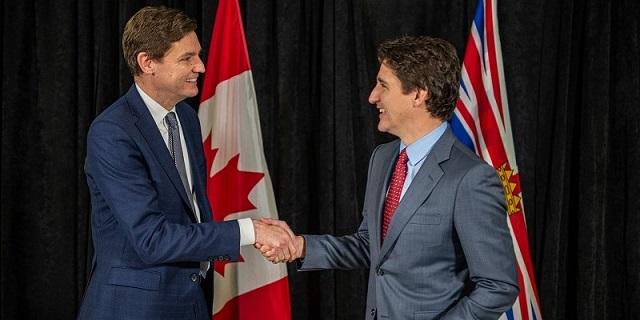Economy
Prime minister and premier combine to reduce living standards in B.C.

From the Fraser Institute
By Jake Fuss
In B.C., the Eby government is following the prime minister’s lead. After nearly two decades of spending restraint (1999/00 to 2016/17), the province has experienced an explosion in government spending. Program spending will increase from $46.1 billion in 2016-17 to a projected $85.3 billion this year, a nominal increase of more than 85 per cent.
Recently, Prime Minister Justin Trudeau and Premier David Eby had a tête-à-tête and vowed to always “work together on important issues.” While they belong to two different political parties, their visions rely on a larger role for government, which includes more spending, regulation, borrowing and higher taxes. Unsurprisingly, this economic strategy hasn’t worked and has instead led to stagnant living standards in British Columbia and across Canada.
Under the NDP, British Columbians have seen their incomes completely stagnate. B.C.’s per-person GDP, a broad measure of living standards, is expected to be lower this year than in 2018, and decline by an average annual rate of 0.9 per cent from 2022 to 2024—the third biggest drop among the provinces during this period.
This represents a marked departure from the economic results under the previous government. From 2001 to 2017, per-person GDP grew (on average) by 1.4 per cent. And the average British Columbian’s income increased by 27 per cent over these 16 years.
The decline in living standards is also occurring nationally. Canada’s per-person GDP was lower at the end of 2023 than it was in 2014.
Why?
Since first elected in 2015, Prime Minister Trudeau has greatly expanded the federal government’s role in the Canadian economy. Federal program spending (total spending excluding debt interest costs) will increase from $256.2 billion in the final full year of the Harper government to a projected $483.6 billion in 2024-25, an increase of nearly 90 per cent over a decade. The government has financed this spending surge through tax increases and borrowing.
Specifically, the Trudeau government in 2016 raised the top personal income tax rate (which applies to many entrepreneurs and businessowners) and also opaquely increased taxes on middle-income Canadians by eliminating several tax credits (as a result, 86 per cent of middle-income families now pay higher taxes). Federal debt has spiked considerably to finance the government’s insatiable appetite for spending, reaching nearly $2.1 trillion this year, almost double the level in 2014-15.
In B.C., the Eby government is following the prime minister’s lead. After nearly two decades of spending restraint (1999/00 to 2016/17), the province has experienced an explosion in government spending. Program spending will increase from $46.1 billion in 2016-17 to a projected $85.3 billion this year, a nominal increase of more than 85 per cent.
With Premier Eby’s plan to ramp up spending further in the next few years and incur substantial deficits, B.C.’s net government debt is projected to reach a whopping $128.8 billion by 2026/27—a 227 per cent increase since 2016-17.
The B.C. NDP has also raised one tax after another to feed its appetite for spending. The government hiked personal income tax rates from 14.7 per cent to 16.8 per cent on income between roughly $181,000 and $253,000, and introduced a new top tax rate of 20.5 per cent for top-income earners. And raised the business tax rate from 11.0 to 12.0 per cent in 2018, deterring badly needed investment in the province.
Prime Minister Trudeau and Premier Eby are pursuing the same policies and achieving the same miserable economic results. Simply put, the Trudeau-Eby zero economic growth alliance has reduced the living standards of British Columbians and Canadians.
Author:
Bjorn Lomborg
The stupidity of Net Zero | Bjorn Lomborg on how climate alarmism leads to economic crisis

From spiked on YouTube
Note: This interview is focused on Europe and the UK. It very much applies to Canada. The 2025 Federal Election which will see Canadians choose between a more common sense approach, and spending the next 4 years continuing down the path of pursuing “The Stupidity of Net Zero”.
European industry is in freefall, and Net Zero is to blame.
Here, climate economist Bjorn Lomborg – author of Best Things First and False Alarm – explains how panic over climate change is doing far more damage than climate change itself. Swapping cheap and dependable fossil fuels for unreliable and expensive renewables costs our economies trillions, but for little environmental gain, Lomborg says.
Plus, he tackles the myth of the ‘climate apocalypse’ and explains why there are more polar bears than ever.
Support spiked: https://www.spiked-online.com/support/
Sign up to spiked’s newsletters: https://www.spiked-online.com/newslet…
Business
Scott Bessent Says Trump’s Goal Was Always To Get Trading Partners To Table After Major Pause Announcement


From the Daily Caller News Foundation
By
Secretary of the Treasury Scott Bessent told reporters Wednesday that President Donald Trump’s goal was to have major trading partners agree to negotiate after Trump announced a 90-day pause on reciprocal tariffs for many countries after dozens reached out to the administration.
Trump announced the pause via a Wednesday post on Truth Social that also announced substantial increases in tariffs on Chinese exports to the United States, saying 75 countries had asked to talk. Bessent said during a press event held alongside White House press secretary Karoline Leavitt that Trump had obtained “maximum leverage” to get trading partners to negotiate with the April 2 announcement of reciprocal tariffs.
“This was his strategy all along,” Bessent told reporters during an impromptu press conference at the White House. “And that, you know, you might even say that he goaded China into a bad position. They, they responded. They have shown themselves to the world to be the bad actors. And, and we are willing to cooperate with our allies and with our trading partners who did not retaliate. It wasn’t a hard message: Don’t retaliate, things will turn out well.”
Dear Readers:
As a nonprofit, we are dependent on the generosity of our readers.
Please consider making a small donation of any amount here.
Thank you!
WATCH:
China imposed retaliatory tariffs on American exports to the communist country Wednesday, imposing an 84% tariff on U.S. goods after Trump responded to a 34% tariff by taking American tariffs to 104%.
“Based on the lack of respect that China has shown to the World’s Markets, I am hereby raising the Tariff charged to China by the United States of America to 125%, effective immediately,” Trump said. “At some point, hopefully in the near future, China will realize that the days of ripping off the U.S.A., and other Countries, is no longer sustainable or acceptable.”
“They kept escalating and escalating, and now they have 125% tariffs that will be effective immediately,” Bessent said during the press conference.
Bessent said that China’s actions would not harm the United States as much as it would their own economy.
“We will see what China does,” Bessent said. “But what I am certain of, what I’m certain of, is that what China is doing will affect their economy much more than it will ours, because they have an export-driven, flood the world with cheap export model, and the rest of the world now understands.”
The Dow Jones Industrial average closed up 2,962.86 points Wednesday, with the NASDAQ climbing by 1,755.84 points and the S&P 500 rising 446.05 points, according to FoxBusiness.
-

 2025 Federal Election1 day ago
2025 Federal Election1 day agoRCMP memo warns of Chinese interference on Canadian university campuses to affect election
-

 2025 Federal Election1 day ago
2025 Federal Election1 day agoResearchers Link China’s Intelligence and Elite Influence Arms to B.C. Government, Liberal Party, and Trudeau-Appointed Senator
-

 MAiD2 days ago
MAiD2 days agoDisability rights panel calls out Canada, US states pushing euthanasia on sick patients
-

 Justice2 days ago
Justice2 days agoCanadian government sued for forcing women to share spaces with ‘transgender’ male prisoners
-

 Alberta2 days ago
Alberta2 days agoAlberta takes big step towards shorter wait times and higher quality health care
-

 Energy2 days ago
Energy2 days agoTrump signs four executive orders promoting coal industry
-

 COVID-1922 hours ago
COVID-1922 hours agoFauci, top COVID officials have criminal referral requests filed against them in 7 states
-

 Business1 day ago
Business1 day agoScott Bessent Says Trump’s Goal Was Always To Get Trading Partners To Table After Major Pause Announcement










